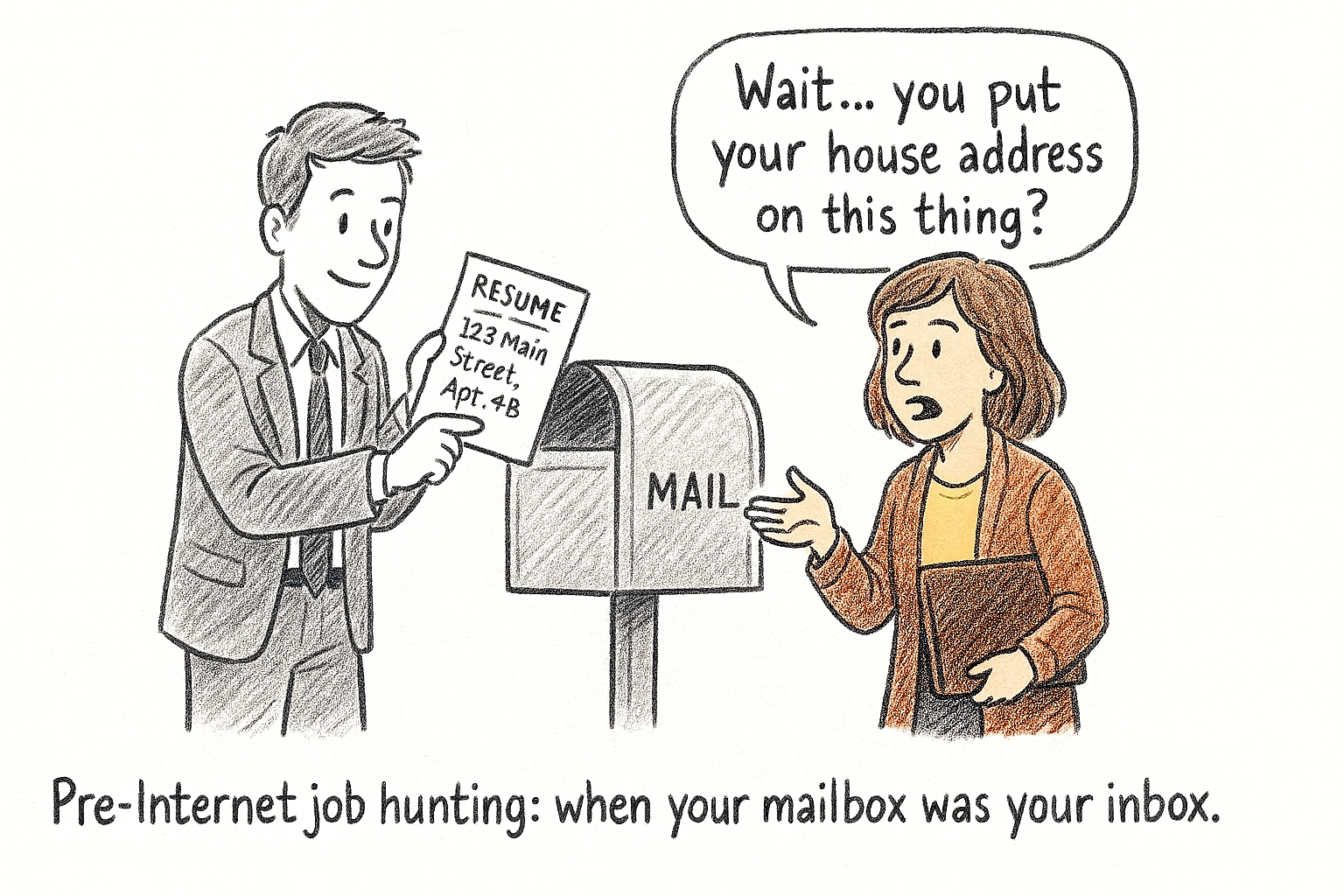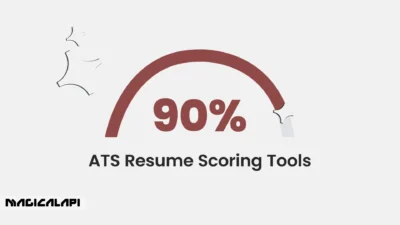Developing the ideal resume is precise and strategic. Every word, every bullet point, and every section is prime real estate to help sell you. The role of your address at the top of the resume may seem fairly simplistic, but including it can spark a discussion. For decades, stating a full home address was considered as standard as stating your name. This is no longer the case. Candidates today must now ponder: Should you place your address on your resume?
The shift from paper to digital has created a cultural shift in hiring, turning what once was a standard into a somewhat complex decision that impacts consideration of privacy, safety, and the potential loss of an interview opportunity. This ultimate guide will take a deep dive into the history of this practice, evaluate modern-day decisions for and against including one’s address, and provide actionable strategies for handling your location on a resume in 2025 and beyond.
Table of Contents
Why Resumes Used to Always Include an Address: A Look Back
To understand why this question exists, let’s go back to a time before online job boards and one-click applications. In what we now call the “pre-internet era,” job searching was a physical, paper-based process. Job ads came from newspapers, and job applications were typed, printed, and sent “snail mail.”
In this context, your full address was a mandatory part of your resume. Why? Because in those days, it was the only way a potential employer would communicate with you.
They would send you an invitation for an interview, a request for more information, or a job offer letter via your physical mailbox. For recruiters, an address was a key logistical filter. It told them if you were local, and could come to an interview in person, or if they would potentially have to organize travel in the future. The address was a necessary component of what was a completely offline process.

The Great Shift: Do Employers Still Expect an Address on a Resume?
With the emergence of the internet, everything changed. Email took over as the business communication standard, and the newspaper job posting was replaced by online job boards such as LinkedIn, Indeed, and ZipRecruiter. The entire business communication landscape was flipped upside down, making the use of a full mailing address virtually useless for the first step of the hiring process.
In today’s business world, most employers will not expect to see your full street address at the top of your resume. Employers understand that your first form of communication will likely be via email or a phone call. When reviewing resumes, recruiters are much more focused on your skills, work experience, and what you can bring to their company than what street you live on.
Read More: Should You Include a Picture on Your Resume?
So much so that many hiring managers and career coaches today believe the inclusion of a full address is a bit dated and shows that a candidate may not be fully in tune with appropriate modern-day standards.
Stateside (US), however, there are many variations in expectations from industry to industry. Some really traditional industries or government agencies may still be working with archaic standards, and may require a full address in their processes – but that will be generally because of bureaucratic processes or to check security clearance, etc.
But for the vast number of private sector jobs the answer to “Do you need an address on a resume?” is no. With the technology that we now have, including Resume Parsers that analyze experience and top skills, it may never even see your street address!
Magical Resume Parser
Discover the powerful capabilities of the Magical Resume Parser and explore the various options available to streamline your hiring process, optimize candidate selection, and enhance recruitment efficiency.
The Case for Including Your Address (The Pros)
Although there is certainly a greater trend towards not listing your full address, there are some occasions where a mention of your location may be beneficial.
1. Showcasing the ‘Local Candidate’ Value
For jobs that are fully in-person (let’s say in a hybrid role) being a local can add value. If a recruiter sees your resume and the city and state are local, they will make some automatic assumptions.
- No Relocation Needed: The company will not have to deal with the expenses and intricacies of a relocation package.
- Easy Commute: There is an assumption that the local candidate will end up having a more manageable commute which should increase punctuality and have an impact on the overall work-life balance.
Part of the Community: For certain roles – especially in the small or medium-sized company – being a member of the local community can be an important factor, to be part of a community can even outsized the work experience.
By putting your city and state (and perhaps ZIP code), you signal that you are a convenient, logistical low-risk candidate, which may give your application a slight edge.
Read More : Resume Checklist
2. Applying for Hyperlocal Roles
Some jobs are inherently linked to a geographic area. Examples might include a field sales representative for a specific territory, a community outreach coordinator, or a local journalist for a specific area. In these cases, to be able to show a hiring manager that you live in or very near the area is a direct qualification for the job. Your home address indicates that you are familiar with that region, and can be present in that region as needed.
Read More: Should My Resume Have Color?
The Case Against Including Your Address (The Cons)
There’s a good case to be made for omitting your home address from your résumé based on arguments related to privacy, security and fairness.
1. Major Privacy and Security Risks
Your home address is sensitive personal information. When you provide it on a résumé, you are giving up control over who gets to see it. If you upload your résumé to a public job board, your home address could potentially be accessed by scammers, identity thieves or any other persons of bad intent.
In a worst-case scenario, it could even be a risk to your personal safety. Protecting your private data is an essential aspect of being a responsible actor in the digital landscape and your job search is no exception.
2. The Pervasive Issue of Bias and Discrimination
This is probably the most important reason to omit your address. There are many ways that unconscious bias can enter the hiring process, and your address can certainly be one of them. A recruiter may make assumptions about your neighbourhood, or ZIP code leading to to “commute bias” (that you will be an unreliable employee because you live far away), or “neighbourhood stigma” (making judgments about your socio-economic status, lifestyle, or background).
By removing your specific address, you are forcing recruiters to assess you on your own merits; your skills and qualifications, rather than their potentially biased assumptions about your location.
3. The Relocation Dilemma
If you’re applying for jobs in a different city or state, including your current address may result in your application being rejected immediately. Recruiters may see your out-of-state address and conclude that you are not serious about moving, do not realize the job is not remote, or that it would be too much of a hassle to hire you.
Omitting your address or getting creative with your address gives you flexibility. You can explain your plans to relocate in a cover letter, or provide additional detail in the interview.
Smart Alternatives to a Full Street Address
If the full address is out, what’s in? The modern resume is prioritizing a streamlined path that still relates context without an overshare.
- City, State: The new gold star. “New York, NY” or “Chicago, IL” delivers ample information to the employer at the time of the initial stage.
- City, State, ZIP Code: If you want to share a little bit more context, this may help. For major metropolitan areas, this helps identify where in the city you likely are located.
- Metropolitan Area: “Greater Boston Area” or “San Francisco Bay Area” if you live in a suburb and commute to a major metro area.
- “Willing to Relocate to [City, State]”: This is the best strategy to use for long-distance job seekers. It addresses the recruiter’s biggest concern directly and indicates your level of interest in the location related to the position.
How to Format Your Location on a Resume
Your resume contact information should be professional and clean, and at the top or near the top of the page and easy to find. Let’s see a before and after example:
BEFORE (Old format):
Jane Doe
123 Maple Street
Anytown, USA 12345
(555) 123-4567
AFTER (Modern, Recommended format):
Jane Doe
(555) 123-4567 | [email protected] | linkedin.com/in/janedoe
San Francisco, CA 94105
This modern format is much cleaner, is more space efficient and better protects your private information. A good Resume checker will often flag an old format and recommend a modern format that improves the appearance of your resume.
Magical Resume Checker
Discover the full potential of the Magical Resume Checker and explore the various options available to enhance your resume, optimize it for applicant tracking systems (ATS), and improve your chances of landing your dream job.
Navigating Online Applications and Applicant Tracking Systems (ATS)
You’ve created an awesome resume and have even omitted your address, but now you have an online application that wants the “Street Address” field filled out. This is a frequent challenge. Here are some ways to work through it:
- Assess the Company: Is it a large, established company? If it is a large established company, then you can feel better about providing that information because they probably have a secure system for applicants. If it is a small, unknown company or the job posting itself seems suspicious, then you need to be careful.
- Find Other Options: Sometimes when you are using the system, you can enter your city and state in the first line of the address entry. At least try this to see if it works.
- Use a P.O. Box: If you have a P.O. Box, this is a good substitute for your home address.
- Give the Information (If You Are Comfortable): If you are applying for a job that you really want with a company you trust, you may have to provide your address to continue. By this point, you are producing information for a private company database, not a public profile.
How Recruiters View Resumes Without Addresses
The current general perspective of today’s recruiters is that a whole address is no longer needed. Today’s recruiters are conditioned to be on the hunt for critical qualifications that meet the hiring requirements. A missing street address is not problematic to them; in most instances, a recruiter will not even notice. Recruiters are J-O-B-S-P-A-R.
They only have a few seconds to devote to a resume when they do a preliminary scan. They are looking for job titles, skills, and accomplishments. If city and state is provided (related to location), you’re giving the recruiter all of the info they need. A resume with the highest Resume Score is a resume that has the most relevant content, not personal information.
Magical Resume Score
Discover everything you need to know about Magical Resume Score , how it evaluates your resume, and the various options available to enhance your job application and improve your chances of success.
Final Verdict: Address or No Address on Your Resume?
In conclusion, let’s simplify this. Should you put your address on your resume? In most cases, for the majority of job seekers in 2025, the answer is a definite no – do not include your full street address. The risks to your privacy and potential bias far exceed any incremental advantage.
Rather, use a modern and strategic approach by simply providing your City and State or metropolitan area. Potential employers need a point of reference and location without providing personal information.
The standards of resume writing are always changing. What was once standard is now considered an outdated practice. By not putting your full address on your resume, you are not only guarding yourself, but also showing that you are a contemporary, savvy professional.
You are taking charge of your personal narrative and making sure you are described exclusively by your abilities, not your street name. Concentrate on writing a strong summary, detailing your accomplishments, and learning how to write a job description for a resume that sells your value, because that is where you can win the interview.
FAQs about should you put your address on your resume
1. Is a resume really supposed to include an address?
No. A full physical address is not a necessary component in a new resume, and most applications only want your city and state as part of the job application. A full address can create privacy risks and open potential biases against you in hiring, as well.
2. Will not having an address on my resume hurt my job chances?
It is highly improbable. Most recruiters and Applicant Tracking Systems (ATS) are not paying attention to a street address. Rather, they are focused on your capabilities, experience, and geographic location (city/state) to see if you are a potential candidate. Not including an address is perfectly acceptable, and has become a normal practice.
3. What do I do if I am moving? How do I indicate my location?
If you are moving for a job, it is better to state that fact plainly on the resume. In the contact section write: “Willing to relocate [Target City, State].” This indicates an intent to move and also lets recruiters know you won’t get ruled out just for having an out-of-state address.
4. Is it ever OK to lie about my location on a resume?
No! It is not OK to lie on your resume – that’s unethical and it causes many problems. If an employer finds out you lied on your location, they may immediately eliminate you from consideration or if you have gotten hired, you will likely get fired. Always better to be honest using a strategy like, “Willing to relocate.”





